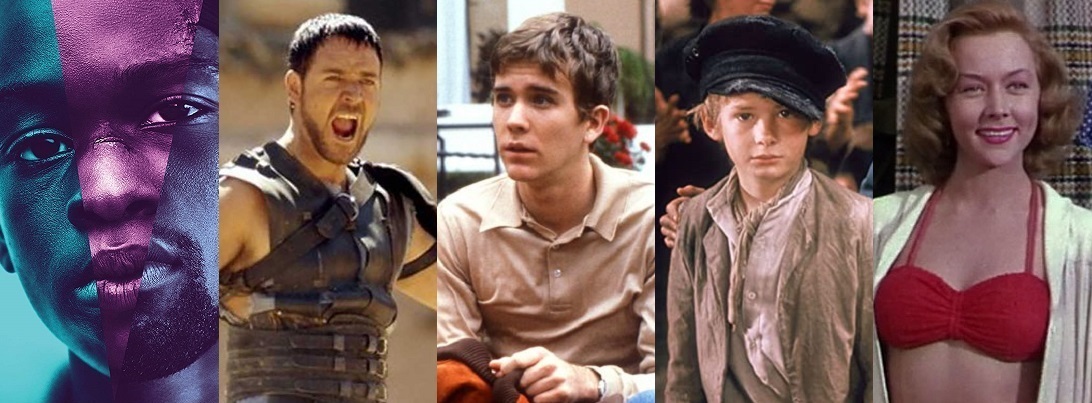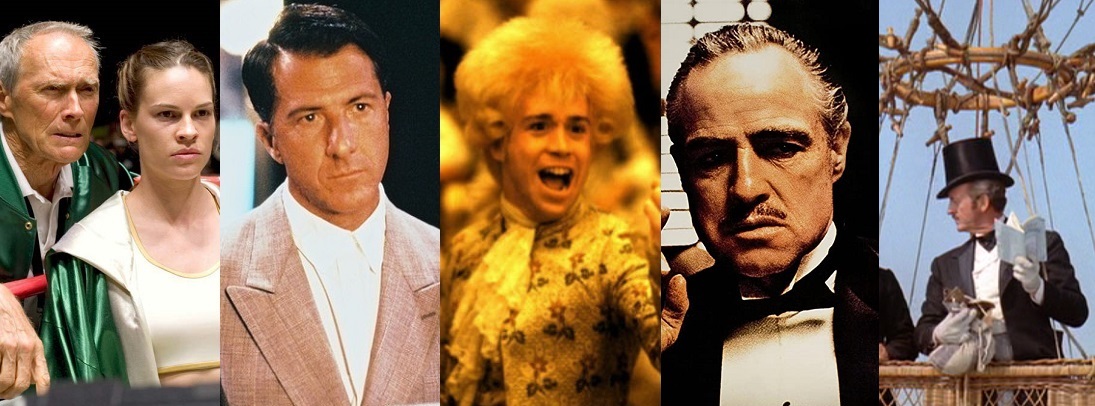The 2020 United States Presidential Election is now (more or less) behind us as we head deeper into awards season. While there isn’t a direct correlation between the President’s political affiliation and the subsequent Best Picture Oscar winner, there are some trends we can point to. What kinds of films win the big award in years that a Democrat takes office? What about a Republican? Let’s see what we can discover from year to year!
Scenario #1: A Democrat Replaces a Republican

Years: 2020*, 2008, 1992, 1976, 1960, 1932
This is the scenario we find ourselves in now, so it’s the most relevant to our interests this year. In fact, most of the times this scenario has occurred involved deeply-unpopular incumbents making way for Democrats with far wider appeal (Obama, Clinton, JFK, FDR). As such, the movies that win in these years tend to be more light-hearted, whether it’s an Indian fairytale (Slumdog Millionaire), a rousing sports classic (Rocky), a heartwarming rom-com (The Apartment), or a multi-perspective human drama (Grand Hotel). The lone exception to this trend is Clint Eastwood’s Western drama Unforgiven, which provides plenty of genre fare but also challenges the tropes and trends of the subtype. It would be easy to generalize and say that Hollywood is in a celebratory mood in years like this, but many of these movies also tend to be introspective and draw commentary on society in meaningful ways. One thing’s for sure: rarely will you find a dour, depressing subject matter win in years like this. Even the most downtrodden of these films had enough fun action to be labelled as audience-friendly.
Scenario #2: A Republican Replaces a Democrat

Years: 2016, 2000, 1980, 1968, 1952
On the other hand, many of these Republican victories were more contentious and led to a more somber, serious tone for the proceeding Oscars. However, surprisingly, the winners don’t always follow that trend. Sure, we got a gay coming-of-age tale (Moonlight) a heartbreaking tragi-drama (Ordinary People), but we also got more lighthearted fare like a grand historical epic (Gladiator), a family-oriented musical (Oliver!), and a circus extravaganza (The Greatest Show on Earth). There doesn’t seem to be much of a throughline between these films, either in tone or in subject matter. I know there are definitely those out there that argue Moonlight only won because of Trump’s upset victory over Clinton, but I would argue that history doesn’t back that claim. It seems the mood of the Academy didn’t have much of an impact – or at least, it didn’t the past several times this happened.
Scenario #3: A Democrat Incumbent Wins

Years: 2012, 1996, 1964, 1948, 1940, 1936
Generally speaking, most people react to incumbent victories (regardless of party) by settling in for a status quo. And as with the previous scenario, these films don’t have a whole lot of connective tissue. We’ve got a couple of period dramas (Argo and The English Patient), a Broadway musical (My Fair Lady), a Shakespeare adaptation (Hamlet), a mystery-thriller (Rebecca), and a light-hearted biopic (The Great Ziegfeld). I would argue that in cases like this, people are focused less on politics by the time the ceremony rolls around and are simply focused on the movies – especially if you’re a left-leaning individual, which many Academy voters are.
Scenario #4: A Republican Incumbent Wins

Years: 2004, 1988, 1984, 1972, 1956
Here we have a sports drama (Million Dollar Baby), a historical biopic (Amadeus), a crime classic (The Godfather), and an adventure thriller (Around the World in 80 Days). This is a tricky category to glean information out of for several reasons, but mainly because of how wildly different the circumstances in each of these years were. George W. Bush was certainly unpopular in Hollywood, but before that you had a bona fide Hollywood star in the White House (Reagan), a president on the cusp of a scandal and departure from office (Nixon), and an authoritarian military man in the McCarthy “Red Scare” era (Eisenhower). I’m also throwing in George H.W. Bush’s win (the sole outlier to these four scenarios) since he was essentially an extension of Reagan’s term…that year, we got a road-trip comedy-drama (Rain Man). Another mixed-bag of winners here, but again, I’m chalking it up to voters settling in for the status quo as well as the widely-varied factors at play in each of these election years. Not enough significant data to back up any claims on trends.
Conclusion
Interestingly, the only scenario that seems to have any kind of meaningful trend behind its winners is the one we find ourselves in now. As a deeply-unpopular president (by Hollywood standards) exits office and a Democrat takes over, how will Oscars voters react with their ballots at the 93rd Academy Awards? Will we get something lighthearted and crowd-pleasing (The Trial of the Chicago 7, News of the World), something more dour and introspective (Mank, Nomadland), or something in between (One Night in Miami, Ma Rainey’s Black Bottom)? History tells us to expect something fun and carefree, but it’s never that cut-and-dry.
-Austin Daniel
All image rights belong to the films’ respective studios/distributors.